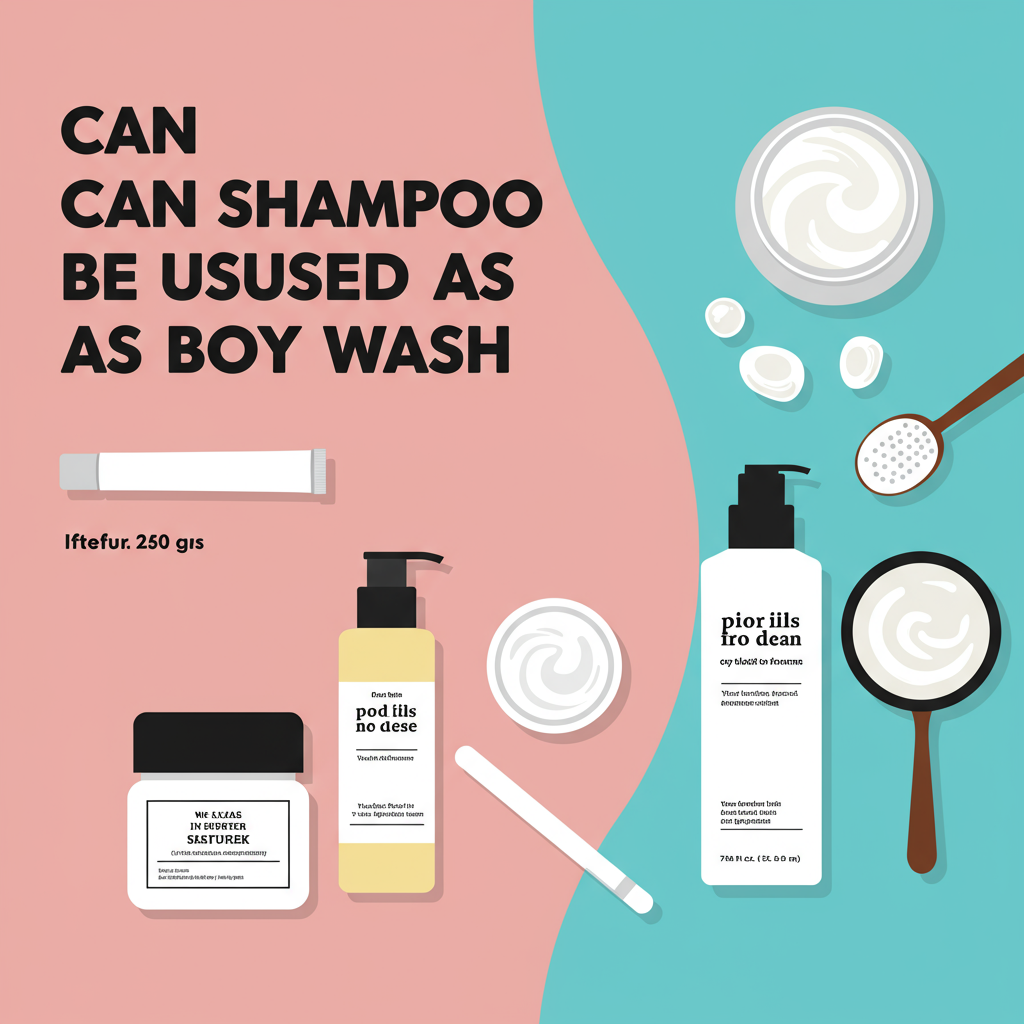We’ve all been there: you step into the shower, ready for a refreshing cleanse, only to find your body wash bottle disappointingly empty. Your eyes drift to the shampoo, sitting there, full of sudsy promise. A common question immediately springs to mind: “Can shampoo be used as body wash?” It’s a universal dilemma, often born out of necessity, curiosity, or a desire for simplification. While the idea of a single product for head-to-toe cleaning is appealing, the reality is a bit more nuanced than a simple yes or no.

This comprehensive guide will dive deep into the world of hair and skin cleansing, exploring the fundamental differences and surprising similarities between shampoo and body wash. We’ll uncover the pros and cons of making the switch, discuss when it might be acceptable in a pinch, and, crucially, when you should absolutely avoid it. By the end, you’ll have a clear understanding of how these products interact with your skin and hair, empowering you to make informed decisions for your daily hygiene routine. Let’s get sudsy with the facts!
The Core Question: Can Shampoo Be Used As Body Wash?
The short answer to “can shampoo be used as body wash” is: yes, in a pinch, but it’s generally not recommended for regular use. Both products are designed to cleanse, meaning they contain surfactants – foaming agents that lift dirt, oil, and impurities from surfaces. This fundamental similarity is why shampoo can technically get your body clean. However, their formulations are optimized for very different parts of your body, leading to potential issues if used interchangeably long-term.
Think of it this way: a screwdriver can technically hammer a nail, but a hammer does a much better job and causes less damage. Similarly, while shampoo can clean your body, it might not provide the best experience or benefits for your skin compared to a dedicated body wash. Understanding these distinctions is key to maintaining both healthy hair and skin.
Understanding the Differences: Shampoo vs. Body Wash
While both products aim to cleanse, their specific chemical compositions and intended targets differ significantly. These differences are crucial when considering if shampoo can be used as body wash without adverse effects.
Purpose and Formulation
- Shampoo: Primarily formulated to clean the hair and scalp. It’s designed to remove excess oil (sebum), product buildup, and environmental pollutants from hair strands and follicles. Shampoos often contain ingredients aimed at specific hair concerns, such as volumizing, color protection, frizz control, or deep conditioning agents to smooth the hair cuticle.
- Body Wash: Created to cleanse the skin on your body. Its formulation focuses on removing dirt, sweat, and surface oils without stripping the skin of its natural moisture. Body washes frequently include moisturizing ingredients like glycerin, shea butter, or various oils to hydrate the skin, along with pH-balancing agents to maintain the skin’s natural barrier.
Key Ingredients
Both products share common ingredients, but their types and concentrations vary:
- Surfactants: Both contain these cleansing agents. However, shampoos often use stronger surfactants (like Sodium Lauryl Sulfate or Sodium Laureth Sulfate) to effectively cut through hair oils and styling products. Body washes tend to use milder surfactants to be gentler on the skin.
- Conditioning Agents: Shampoos, especially 2-in-1 formulas, are rich in conditioning agents (e.g., silicones, polyquaterniums) to detangle, soften, and add shine to hair. These ingredients can leave a residue on the skin, potentially clogging pores. Body washes typically contain fewer or lighter conditioning agents, focusing more on hydration.
- Moisturizers: Body washes are usually packed with humectants and emollients to prevent skin dryness. While some shampoos might have moisturizing elements for the scalp, they are generally not as concentrated or suitable for widespread skin hydration.
- pH Levels: The optimal pH for healthy hair and scalp is typically slightly acidic (around 4.5-5.5). Skin, while also slightly acidic, generally prefers a pH closer to 5.5. Shampoos are formulated to match scalp pH, which can sometimes be too acidic or otherwise unbalanced for the rest of the body’s skin, potentially disrupting its natural barrier.
The Pros of Using Shampoo as Body Wash (When It’s Okay)
There are a few scenarios where using shampoo to wash your body might be a convenient or even necessary choice. These are typically short-term solutions rather than long-term habits.
- Emergency Situations: Ran out of body wash? Travelled and forgot it? A quick shower with shampoo is perfectly fine to get clean in a pinch.
- Travel Light: For minimalists or short trips, packing one less bottle (especially if it’s a mild, basic shampoo) can save space and weight. Look for “hair and body wash” products specifically designed for this purpose.
- Cost-Saving (Temporary): If you’re really in a bind financially, using an existing shampoo can save you from buying another product immediately.
- Mild Formulations: If you use a very gentle, sulfate-free, fragrance-free, and paraben-free shampoo, it’s less likely to cause immediate irritation to your skin compared to a harsh, chemically-laden one.
The Cons and Potential Downsides
While a one-off use might be harmless, consistent use of shampoo as body wash can lead to several undesirable effects on your skin.
- Skin Dryness and Irritation: Shampoos often contain stronger detergents designed to strip oils from hair. These can be too harsh for the delicate skin on your body, leading to dryness, tightness, itching, and even irritation, especially for those with sensitive skin.
- Residue Build-up: Many shampoos contain conditioning agents (like silicones) that are great for hair but can leave a sticky or waxy film on your skin. This residue can clog pores, potentially leading to body acne (bacne) or a feeling of not being fully clean.
- Disruption of Skin’s pH Balance: As mentioned, shampoos are pH-balanced for the scalp. Using them on your body can disrupt your skin’s natural acidic mantle, making it more vulnerable to bacteria, irritation, and moisture loss.
- Scent Overload/Mismatch: Shampoos often have strong, distinctive fragrances that might not be pleasant when applied all over your body, or they might clash with your deodorant or perfume.
- Worsening Skin Conditions: If you have pre-existing skin conditions like eczema, psoriasis, or severe dry skin, using shampoo as body wash can exacerbate these issues due to its harsher formulation and lack of skin-specific moisturizing ingredients.
- Lack of Targeted Benefits: Body washes are formulated with specific skin benefits in mind – deep hydration, exfoliation, soothing sensitive skin, etc. Shampoo won’t offer these targeted benefits for your skin.
When to Use Shampoo as Body Wash (and When to Avoid It)
Knowing when it’s appropriate to make the swap is key to preventing skin woes.
When It’s Generally Safe (for occasional use):
- True Emergencies: You literally have no other cleansing product. Get clean, but don’t make it a habit.
- Very Short Trips/Camping: If you’re trying to pack light for a single night or two and your skin isn’t particularly sensitive.
- Using Mild, All-Natural, or Baby Shampoos: These tend to have fewer harsh chemicals, dyes, and fragrances, making them less irritating. Look for formulas labeled “sulfate-free” or “gentle.”
- If You Have Oily, Non-Sensitive Skin: Individuals with very resilient, oily skin might tolerate shampoo better than those with dry or sensitive skin.
When to Think Twice (or Never):
- Dry or Sensitive Skin: If your skin is prone to dryness, flakiness, or irritation, shampoo will likely exacerbate these issues.
- Eczema, Psoriasis, or Other Skin Conditions: Harsh surfactants and potential allergens in shampoo can trigger flare-ups or worsen existing conditions.
- After Sun Exposure: Sun-damaged skin is already compromised and needs extra gentle care and hydration, which shampoo typically won’t provide.
- Long-Term, Regular Use: This is a recipe for chronic dryness, irritation, and potential skin barrier damage.
- Using Shampoos with Strong Chemicals or Heavy Conditioners: Products designed for specific hair treatments (e.g., clarifying shampoos, heavily conditioning shampoos) are especially ill-suited for body cleansing.
Tips for a Better Body Cleansing Experience
To avoid the dilemma of “can shampoo be used as body wash,” consider these practical tips for optimal skin health:
- Invest in a Good Body Wash: Choose a formula that matches your skin type – moisturizing for dry skin, gentle for sensitive skin, or clarifying for acne-prone skin. Look for ingredients like glycerin, ceramides, and hyaluronic acid.
- Consider a “Hair & Body Wash”: Many brands offer dual-purpose products specifically formulated to be gentle and effective for both hair and skin. These are excellent for travel or simplifying your routine.
- Always Moisturize: Regardless of what you use to wash, always apply a good body lotion or cream immediately after showering to lock in moisture.
- Patch Test: If you must use shampoo on your body, test a small area first to see how your skin reacts, especially if you have sensitivities.
- Use a Gentle Cleansing Bar: Many soap bars are formulated to be very mild and moisturizing for the body, offering a cost-effective alternative to liquid body wash.
Recommended Products
Dr. Bronner’s Pure-Castile Liquid Soap
A highly versatile, concentrated soap that can be diluted for use as a body wash, shampoo (diluted!), and many other cleaning tasks. Available in various natural scents and unscented options.
CeraVe Hydrating Body Wash
An excellent choice for everyday body cleansing, especially for dry and sensitive skin. It’s fragrance-free, non-comedogenic, and contains ceramides and hyaluronic acid to help restore the skin’s protective barrier.
Vanicream Gentle Body Wash
Formulated for sensitive skin, this gentle cleanser is free of common irritants like dyes, fragrance, parabens, and sulfates. It cleanses effectively without drying out the skin, making it a safe choice for daily use.
Aveeno Daily Moisturizing Body Lotion
A fragrance-free, non-greasy lotion with colloidal oatmeal that helps to soothe and protect dry, sensitive skin. Essential for post-shower hydration, especially if you’ve used a less-than-ideal cleanser.
Frequently Asked Questions (FAQ)
Q1: Is it bad to use shampoo as body wash daily?
Yes, it is generally bad to use shampoo as body wash daily. Shampoos are formulated with stronger surfactants designed to strip oils from hair and scalp, which can be too harsh for the delicate skin on your body. Regular use can lead to dryness, irritation, disruption of the skin’s natural pH balance, and potential clogging of pores due to conditioning agents.
Q2: What happens if I use shampoo on my body?
If you use shampoo on your body occasionally, you might experience no immediate adverse effects, or perhaps a feeling of slight dryness or tightness. However, consistent use can lead to dry, itchy, or irritated skin, especially if you have sensitive skin. It can also leave a residue on your skin, potentially causing body acne, and disrupt your skin’s natural protective barrier.
Q3: Can I use 2-in-1 shampoo and conditioner as body wash?
Using a 2-in-1 shampoo and conditioner as body wash is generally even less advisable than using regular shampoo. These products contain a higher concentration of conditioning agents (like silicones) designed to coat hair. These ingredients are more likely to leave a heavy, pore-clogging film on your skin, potentially leading to breakouts and a greasy feeling.
Q4: What’s the best shampoo to use as body wash in an emergency?
In an emergency, opt for the mildest shampoo you have. Look for formulas that are labeled “gentle,” “sulfate-free,” “fragrance-free,” or “baby shampoo.” These typically contain fewer harsh chemicals and are less likely to cause significant irritation in a single use. Always moisturize thoroughly afterward.
Q5: Will shampoo dry out my skin?
Yes, shampoo can definitely dry out your skin. Its primary function is to remove oil and buildup from hair and scalp. The detergents used are often stronger than those in body washes, stripping away your skin’s natural protective oils and moisture, leading to a feeling of dryness, tightness, and sometimes flakiness.
Q6: Can I use baby shampoo as body wash?
Baby shampoo is often a safer choice for occasional use as body wash compared to adult shampoos. It’s typically formulated to be “tear-free” and very gentle, meaning it contains milder surfactants and fewer harsh chemicals, dyes, and fragrances. While still not ideal for regular adult body cleansing, it’s a better emergency option, especially for sensitive skin.
Conclusion
So, can shampoo be used as body wash? The definitive answer is: yes, you *can* use it in a pinch, but it’s far from ideal for your skin’s long-term health. While both products cleanse, their formulations are tailored for different purposes and pH levels. Shampoo is designed to tackle hair oils and buildup, often with stronger surfactants and conditioning agents that can be too harsh or leave residue on your skin. Body wash, on the other hand, prioritizes gentle cleansing and hydration, respecting your skin’s delicate barrier.

For the occasional emergency or a minimalist travel packing strategy, a mild, sulfate-free shampoo might suffice, especially if you follow up with a good moisturizer. However, for daily hygiene, investing in a dedicated body wash that suits your skin type will ensure your skin remains hydrated, healthy, and happy. Prioritize your skin’s well-being, and choose products specifically formulated to care for it. Your skin will thank you!

1 thought on “Can Shampoo Be Used As Body Wash – Glow Naturally Today”